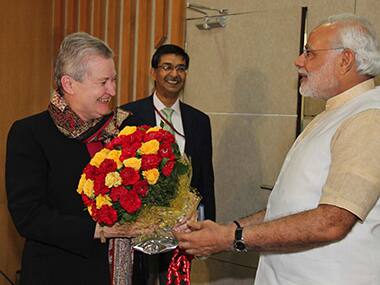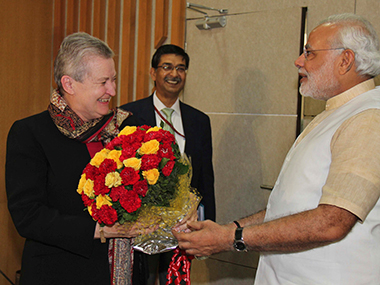Amid reports that Narendra Modi is likely to visit Washington at the invitation of US President Barack Obama, the new Prime Minister appears to be taking increasingly pragmatic steps in building his foreign policy approach. [caption id=“attachment_1459945” align=“alignleft” width=“380”]  The US has already reached out with its ambassador Nancy Powell, now retired, meeting Modi last year. AP[/caption] Having already scored his first brownie points in foreign policy by inviting SAARC leaders to his swearing-in ceremony, Modi is now set to travel to the US most likely in September this year, cocking a snook at critics who had predicted that the former chief minister of Gujarat would not be best placed to mend Indo-US ties that cooled off in the final years of UPA 2 before they sank completely over the Khobragade affair. The Times of India reported that Obama and Modi are set to meet in Washington in the last week of September, following the former’s invitation extended when the US president called Modi to congratulate him on his historic win in the general election. In a statement issued then, Obama had vowed to work closely together with the new Indian Prime Minister in coming years. The Times of India report said, “Significantly, the meeting won’t happen on the sidelines of the United Nations general assembly in New York but in the form of a full-fledged bilateral summit in Washington.” This is doubly significant, given Modi’s history with the US. Since the 2002 Gujarat riots, his visa application was rejected. For several years, he was actually the only person barred from traveling to the US under the country’s International Religious Freedom Act. Meanwhile, Modi has also decided to attend the UN General Assembly meeting, according to IBNLive.com. Doubtless, Modi’s visit to the UNGA and the Modi-Obama summit will be the biggest foreign policy initiatives of the NDA government, despite initial speculation that Modi’s thrust would be first on China, Japan and South Korea and other areas where economy would foreshadow geostrategy in his foreign policy initiatives. The trip to the US would also reflect Modi’s ability to put personal hostilities aside and push forward issues of economic cooperation and more. As DNA reported, Modi’s outreach in the international community appears to be practical and realistic. Even the BJP manifesto deliberately omitted NAM and the promise of a permanent seat at the UN Security Council, DNA pointed out. Certainly, the Modi government would be buoyed by the fact that the US approach also softened last year when a three-member US Republican Party delegation met him in Gujarat. That was followed up by a visit this year from now retired US ambassador to India Nancy Powell who met him in Ahmedabad just before the general elections.
Modi’s accepting the US invitation signals his ability to put aside personal hostilities and forge ahead on matters of business and international cooperation.
Advertisement
End of Article


)
)
)
)
)
)
)
)
)



